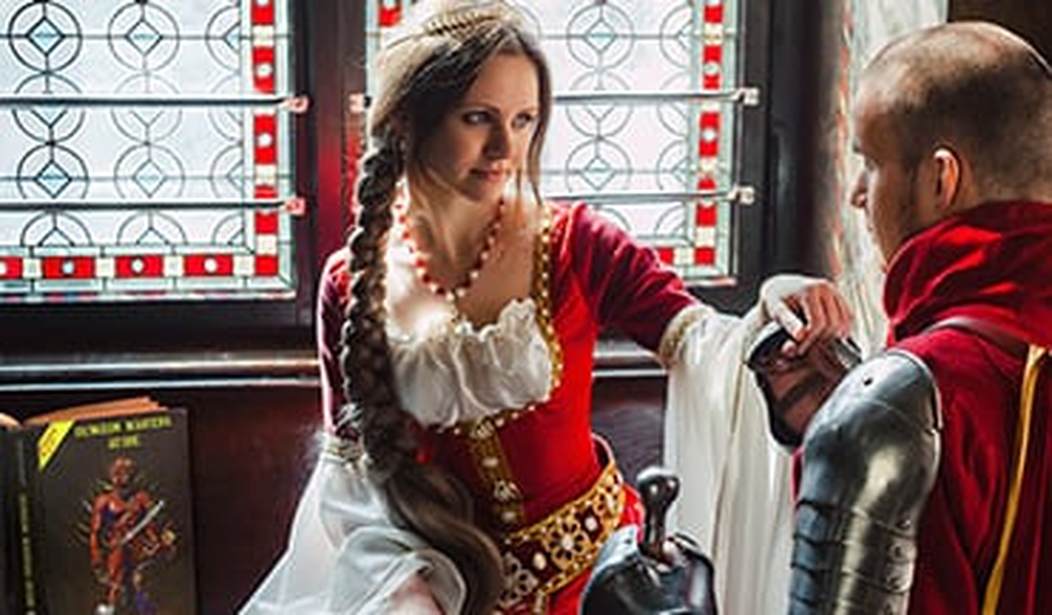Marriage—and by extension, children—are often not addressed in many roleplaying game campaigns (RPGs). At least, not in a very extensive manner. And is that surprising? Probably not: after all, the life of the average adventurer can nasty, brutish, and avoids being short only through the frantic efforts of the people playing the game. To put it mildly, this sort of lifestyle can interfere with a long-term, legally-binding, and formalized emotional/physical relationship with another person. And yet, I will argue why you should consider having your character get married anyway.
First off, the desire to get married is largely in-character for anybody who would want kids—which is to say, most people throughout history. And the ones who didn’t want to have kids typically were expected to have some anyway, particularly if they were in a favored social group. As I’ve noted before, kids should show up in RPGs rather more often than they actually do; and that’s true across class and status lines. Any campaign that has a hereditary nobility (which includes any campaign where specific bureaucratic or military jobs are passed along from parent to child) is going to have a lot of people in it who will have burning interest in making sure that family lines do not die out. And that typically means that a player-character’s (PC’s) marriage will be everybody’s business (at least, in-family), not just his or hers.
Second, there are actual advantages to marriage in a campaign! I obviously don’t need to recount the disadvantages in great detail: like having handy people for your enemies to menace, or for you to rescue. Also, more and more games—particularly in the horror genre—are working with how to use your PC’s existing relationships with friends and family members to make his life a sometimes literal Hell as the campaign shambles to its climax. But that’s just the bad stuff. There’s good stuff, too.
For example: marry a man, and you acquire his family in the process. Depending on the campaign, that family may very well have access to resources and influence that your family does not—indeed, that may be the primary reason why you married into that family in the first place—and those resources might be available to a spouse in the way that they would not be available to a stranger. In practical terms, this means that a smart player can throw his gamemaster (GM) a bone when the GM is visibly trying to figure out how to advance the plot in a believable manner. “Why, my wife’s brother owns a fleet of canal ships! Surely he can help us get downriver.” Bear in mind that if you do that, the GM is going to feel free to complicate your life later by using the hook that you just gave him, but that’s all right. It just means that you’re immersing yourself in the campaign properly.
Immersion is, of course, a good reason in its own right to have your PC get married. Part of the fun of roleplaying is in acting out the way that a heroic (or infamous) character might go through life; and while it’s certainly easy enough to declare that your character would never want to get married, what are the consequences of playing one that would? Or has? It certainly would help with trying to quickly come up with the current emotional state for your character, or to justify a particular motivation; thoughts of home and spouses are traditionally powerful themes in stories, when they’re not stories in their own right. If you want some spotlight time right before the big battle, for example: announce that you’ve just gotten a letter from your wife. If nothing else, it will likely signal to the GM that you’ve just volunteered to be shot at a lot during the upcoming fight.
And that’s the last bit, really: sometimes, the disadvantages are actually advantages after all. Everybody playing in a campaign wants to tell a story about their characters, and have fun while doing it. And it’s a lot easier to tell a story if there are well-known elements and tropes in it. Which is why marriage can be useful: most cultures have marriage and most cultures have stock characters that incorporate the concepts of ‘husband’ and ‘wife,’ and so you can easily allude to a joke or a tragedy in the making with only a few broad strokes, rhetorically speaking. Easier to imagine, easier to evoke, easier to roleplay out. Worth the occasional scene of menacing or hostage-taking, I’d say…
(Artwork created using multiple Shutterstock.com elements.)









Join the conversation as a VIP Member